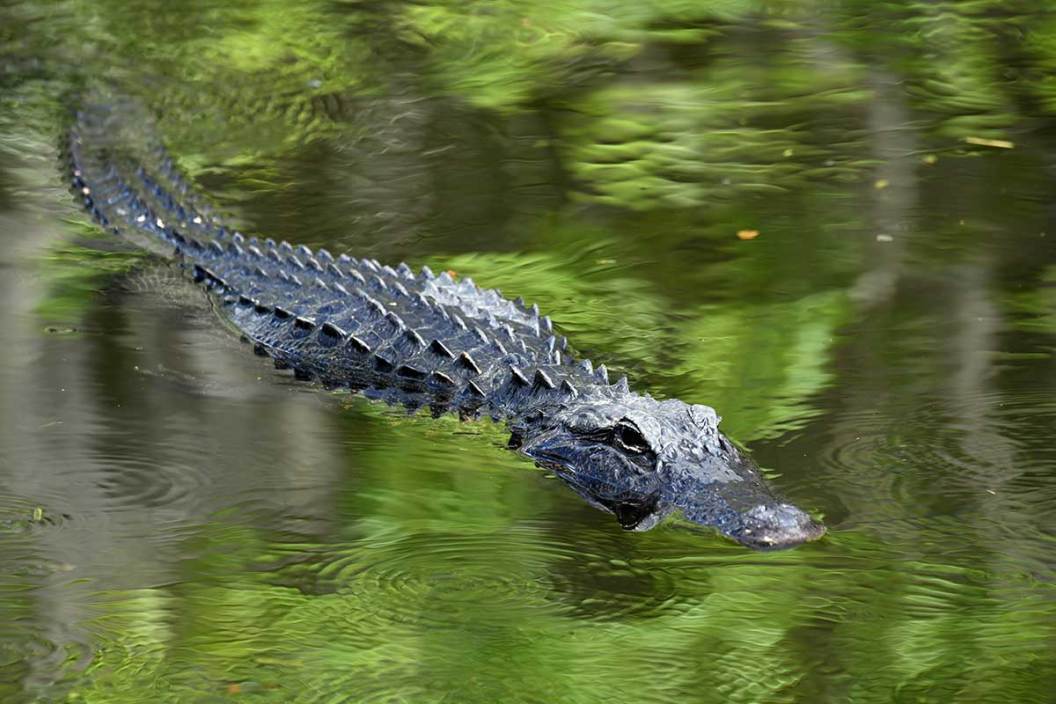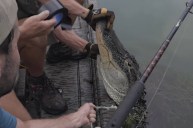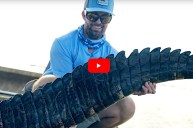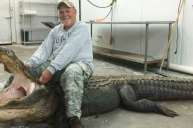The basics of any successful gator hunt may very well include these seven items.
Alligator hunting is a way of life down in the South, which not only creates some space between them and humans, but also helps keep populations at bay with healthy numbers.
Many folks down there have hunted gators all their lives, but every year brings new hunters looking to dip their toes into the swamp.
For those coming from out of state, hiring a reputable outfitter is typically the only way to go, and they fortunately welcome non-resident hunters with open arms.
In the past, the states of Florida, Georgia, Alabama, Arkansas, Mississippi, Louisiana, North Carolina, South Carolina and Texas have all distributed their own alligator hunting licenses, but for our purposes, we'll just focus on the Sunshine State, which is universally considered the mecca of American gator hunting.
For our purposes, we discussed this with our friend and Sporty Girl CEO Kristy Grant. Kristy and her boyfriend Andrew Wooten have seen a gator hunt or two in their time and have some great advice for those thinking of trying to bag their first.
Hunting License
Interestingly enough, the state of Florida doesn't actually require a hunting or a fishing license to take alligators, but it does require hunters to purchase a Statewide Alligator Hunting Permit from the Florida Fish and Wildlife Conservation Commission.
According to the Commission, there are often more than 15,000 applicants that will apply for approximately 7,000 permits. Florida residents have to shell out $272 for one of these prized permits, but non-residents will have to dig even deeper to get one with a fee of $1,022.
There is no charge to apply for a permit, however.
Each successful applicant will receive an Alligator Trapping License, an area-specific harvest permit and two CITES tags, authorizing the holder to harvest two alligators. The harvest areas and hunt dates are specific for each permit, and the permit specifies all the boundaries and limitations of the harvest area.
Again, your best bet is to hire a reputable outfitter.
Airboat or Jon Boat?
For those of us who would like to embark on an alligator hunt but have never had the chance, this may be a foregone conclusion, especially considering the vastness of most swamplands.
Not only is an airboat is a large, expensive piece of equipment that demands serious experience to use safely, but they're also hard on the wallet.
But even with that in mind, would having one of these beauties be a necessity for a gator hunt?
According to Kristy Grant, you're better off in small Jon boat, as air boats are typically too loud.
It depends on who you ask, though. Many believe it's an essential piece of equipment, primarily for outfitters needing to get clients to and from far-away areas.
For many Floridians, though, a boat is just an expensive luxury, as they mostly stick to canal bank hunting.
Harpoon
Alligator hunters can legally use bows, crossbows, gigs, harpoons, spears and spearguns to hunt alligators in Florida. As Kristy says, a harpoon is very important in securing your gator, but you have to secure it with a heavy rope line and a buoy.
"The harpoon is vital to make sure you get a solid connection between hunter and gator," she says. "The gator's hide is very tough, and just using your fishing hook doesn't offer that secure connection that the harpoon will."
Bang Stick
A Powerhead or bang stick is a spear-like mechanism that holds certain firearm ammunition sometimes in the order of .357 magnum or .44 magnum, among others. While a bang stick performs similarly to a firearm, it's actually the spear that acts as the firing hammer.
Hunters often use 12-gauge ammo as a projectile, particularly for the handheld versions, which are arguably the most popular. Some can even propel a barbed spear point into the animal with a secured line of some sort.
The Sporty Girl has a rule of thumb for using the powerhead, though, as these can be very dangerous devices. She says to always pop them underwater for everyone's safety.
Rope, Lots of Rope
Alligator twine, twisted, tarred nylon, whatever you call it, get some and get a bunch. Rope has uses for baiting gators as much as tying them up after a harvest, or getting a grip on them after the harpoon does its job. You really can't go on a gator hunt without it.
Handgun/Long Gun
According to the FFWC, the only firearm you can legally kill a gator with is a bang stick, and even then, it may only be used if the alligator is attached to a restraining line, but that's not true in every alligator hunting state.
Some states, like Louisiana, allow you to use rifles, handguns or archery equipment to dispatch your gator. In Alabama, hunters are limited to bang sticks with a round of .38 caliber or larger, or shotguns. In Georgia, it's handguns, bang sticks and archery gear only.
Intestinal Fortitude
This just may be your number one necessity when it comes to a gator hunt. These hunts can take place at night in a swamp where the only thing between you and a large predatory alligator is the air and common sense.
Alligator hunting comes in the form of targeting an animal that can be as long as your boat, just as heavy, and sporting a mouthful of teeth. For many, it's a simple matter of knowing their prey since they have lived a lifetime around them. Some can still tell you stories of nightmarish hunts that ended with someone getting stitches or worse.
However, the best part of an alligator harvest is the meat you'll stock your freezer with.
Since the American alligator population is doing well, your only trouble will be choosing a recipe for that BBQ gator tail.
Products featured on Wide Open Spaces are independently selected by our editors. However, when you buy something through our links, we may earn a commission.
Looking for a little more or even hot lunch for your hunting blind? Follow my webpage, or on Facebook and YouTube.
NEXT: Q&A WITH SPORTY GIRL APPAREL CEO KRISTY GRANT





